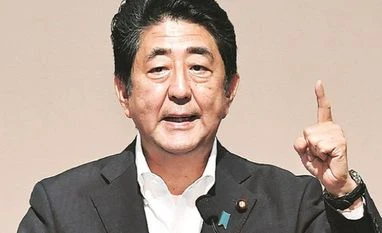An agreement between North and South Korea to hold a summit and signals about possible talks between North Korea and the United States is stirring concern in Japan about its diplomatic nightmare - being left out in the cold.
Signs of easing tension over North Korea’s nuclear and missile threats, greeted in Tokyo with scepticism, come as Japan faces a possible trade feud with the United States over steel and rocky ties with South Korea over their bitter history, including Japan’s 1910-1945 colonization of the peninsula.
“The main concern is that South Korea may have jumped too easily to a proposal by North Korea for a bilateral meeting,” said a former senior Japanese diplomat who declined to be identified because of the sensitivity of the topic.
A South Korean delegation returned home on Tuesday from the first-ever meeting with North Korean leader Kim Jong Un, to announce the agreement on a North-South summit next month, the first since 2007.
The South Koreans also announced that Kim had offered to hold talks with the United States on denuclearization and to halt nuclear and missile tests while negotiating. North Korea’s recent missile tests have included two fired over Japan.
U.S. President Donald Trump said North Korea seemed “sincere”.
The former diplomat said Japanese Prime Minister Shinzo Abe faced uncertain times.
“As for Washington, Trump is such an unpredictable guy. If anything will help elevate his approval domestically, he’ll jump,” he said.
“If North Korea sits down with Washington, it will have absolutely no interest whatsoever in sitting down with Japan. That will make Abe’s position very difficult.”
Japan has maintained its call for “maximum pressure” on North Korea amid signs of easing the tension that began during the Winter Olympics in South Korea last month, warning that “talks for the sake of talks” were unacceptable.
Abe has stressed that Washington shares that stance.
“In order for there to be meaningful talks with North Korea, it must commit to competing, verifiable and irreversible abandonment of its nuclear and missile programs and take concrete steps toward denuclearization,” Defense Minister Itsunori Onodera told reporters on Wednesday.
“Our country will continue cooperation with the United States, and among the United States, Japan and South Korea, and there is no change in our stance of putting maximum pressure, by all means, to get North Korea to change its policies,” he added.
Fear of Abandonment
Abe has called the North Korean crisis the toughest security crisis faced by Japan since World War Two and his stern stance has generally won him support at home.
Despite the long-standing security alliance between the United States and Japan, worries that the United States may cut a deal to protect its cities from nuclear attack by the North, while leaving Japan vulnerable, have simmered.
“Japan’s eternal fear is that it will be cut out of negotiations over the state of relations with North Korea,” said Brad Glosserman, a visiting professor at Tama University.
“The concern is that Trump is prepared to cut a deal and show the world that the ‘special relationship between Shinzo and Donald’, and America and Japan, is empty and that he will rip it up in a heartbeat,” Glosserman said.
Katsuyuki Kawai, an adviser to Abe, is in Washington this week seeking, he told Reuters before departure, to reinforce the alliance and talk up the need for trilateral coordination among the United States, Japan and South Korea.
“Japan is not an observer, Japan is one of the important actors,” Kawai said.
However, ties between Japan and America’s other key Asian ally, South Korea, have been frayed since President Moon Jae-in took office last May and cast doubts over a 2015 agreement meant to lay to rest a feud over “comfort women”, a euphemism for women forced to work in Japanese wartime military brothels.
Both sides have said that dispute should not snarl coordination over North Korea, but the chill is real and any sign Trump was favouring South Korea’s softer approach could fan Japan’s angst.
“If America goes with talks, it aligns more closely with South Korea than Japan at a time when relations with South Korea are rocky,” Glosserman said.
Unlock 30+ premium stories daily hand-picked by our editors, across devices on browser and app.
Pick your 5 favourite companies, get a daily email with all news updates on them.
Full access to our intuitive epaper - clip, save, share articles from any device; newspaper archives from 2006.
Preferential invites to Business Standard events.
Curated newsletters on markets, personal finance, policy & politics, start-ups, technology, and more.
)